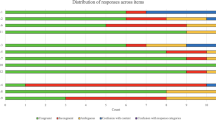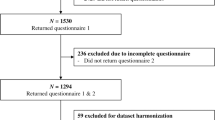Abstract
Study design: Cross-sectional.
Objectives: To investigate relationships between coping and mental well-being with clinical relevance to spinal cord lesion (SCL).
Setting: The Gothenburg Spinal Injuries Unit in Sweden.
Methods: The study sample comprised 274 persons. From in-depth interviews, literature reviews, and the transactional theory of stress and coping, items reflecting coping and psychological outcome, respectively were generated. Principal components factor analysis, multi-trait analysis, and structural equation modelling were used.
Results: The coping scale comprised three factors: Acceptance (i.e. revaluation of life values); Fighting spirit (i.e. efforts to behave independently); Social reliance (i.e. a tendency towards dependent behaviour). The outcome scale included the factors: Helplessness (i.e. feeling perplexed, out of control and low self-esteem); Intrusion (i.e. bitterness and brooding); Personal growth (i.e. positive outcomes of life crisis). Acceptance showed a positive relation to Personal growth and was inversely related to both Helplessness and Intrusion. Fighting spirit had a weak negative association to Helplessness and a weak positive association to Personal growth. Social reliance was positively related to Helplessness and Intrusion. Only Social reliance showed any association to neurological status. Those lesioned 1–4 years reported more Helplessness, Intrusion, Social reliance, and less Acceptance than those lesioned ⩾5 years.
Conclusion: Coping is related to psychological outcome in SCL. Our situational coping measure may be a candidate to assess intervention effects.
Similar content being viewed by others
Log in or create a free account to read this content
Gain free access to this article, as well as selected content from this journal and more on nature.com
or
References
El Masri WS, Short DJ . Current concepts: spinal injuries and rehabilitation Curr Opin Neurol 1997 10: 484–492
North NT . The psychological effects of spinal cord injury: a review Spinal Cord 1999 37: 671–679
Buckelew SP, Baumstark KE, Frank RG, Hewett JE . Adjustment following spinal cord injury Rehab Psychol 1990 35: 101–109
Frank RG et al. Differences in coping styles among persons with spinal cord injury: A cluster-analytic approach J Consult Clin Pscyhol 1987 55: 727–731
Kennedy P, Lowe R, Grey N, Short E . Traumatic spinal cord injury and psychological impact: a cross-sectional analysis of coping strategies Br J Clin Psychol 1995 34: 627–639
Lazarus RS, Folkman S . Stress, Appraisal, and Coping Springer: New York 1984
Folkman S . Positive psychological states and coping with severe stress Soc Sci Med 1997 45: 1207–1221
Wineman NM, Durand EJ, Steiner RP . A comparative analysis of coping behaviors in persons with multiple sclerosis or a spinal cord injury Res Nurs Health 1994 17: 185–194
Hanson S, Buckelew SP, Hewett J, O'Neal G . The relationship between coping and adjustment after spinal cord injury: a 5-year follow-up study Rehab Psychol 1993 38: 41–52
King C, Kennedy P . Coping effectiveness training for people with spinal cord injury: preliminary results of a controlled trial Br J Clin Psychol 1999 38: 5–14
Kennedy P et al. A longitudinal analysis of psychological impact and coping strategies following spinal cord injury Br J Health Psychol 2000 5: 157–172
Parker DA, Endler NS . Coping with coping assessment: a critical review Eur J Pers 1992 6: 321–344
Schwarzer R, Schwarzer C . A critical survey of coping instruments In: Zeidner M, Endler NS (eds) Handbook of Coping: Theory, Research, Applications Wiley: New York 1996 pp. 107–132
Maes S, Leventhal H, de Ridder DTD . Coping with chronic diseases In: Zeidner M, Endler NS (eds) Handbook of Coping: Theory, Research, Applications Wiley: New York 1996 pp. 221–251
Gerhart KA et al. Correlates of stress in long-term spinal cord injury Spinal Cord 1999 37: 183–190
Ditunno JF, Young W, Donovan WH, Creasey G . The international standards booklet of neurological and functional classification of spinal cord injury Paraplegia 1994 32: 70–80
Rydén A et al. Obesity-related coping and distress and relationship to treatment preference Br J Clin Psychol 2001 40: 177–188
Nunally JC, Bernstein IH . Psychometric Theory 3rd edn MacGraw-Hill: New York 1994
Lundqvist C et al. Spinal cord injuries. Part 1: Clinical and functional status Spine 1991 16: 78–83
Ware JE et al.. MAP-R for Windows: Multitrait/Multi-Item Analysis Program–Revised User's Guide Health Assessment Lab: Boston 1997
Kline RB . Principles and Practice of Structural Equation Modeling Guilford: New York 1998
Jöreskog KG, Sörbom D . LISREL 7: A guide to the program and applications 2nd edn SPSS Inc: Chicago 1989
Browne MW, Cudeck R . Alternative ways of assessing model fit In: Bollen KA, Long JS (eds) Testing Structural Equation Models Sage: Newbury Park, CA 1993 pp. 136–162
Bracken M, Bernstein M . Adaptation to and coping with disability one year after spinal cord injury: An epidemiological study Soc Psychiatry 1980 15: 33–41
Craig AR, Hancock K, Chang E . The influence of spinal cord injury on coping styles and self-perceptions two years after the injury Aust N Z J Psychiatry 1994 28: 307–312
Ray C, West II J . Coping with spinal cord injury Paraplegia 1984 22: 249–259
Holahan CJ, Moos RH, Schaefer JA . Coping, stress resistance, and growth: Conceptualizing adaptive functioning In: Zeidner M, Endler NS (eds) Handbook of Coping: Theory, Research, Applications Wiley: New York 1996 pp. 24–43
Bulman RJ, Wortman CB . Attributions of blame and coping in the ‘real world’: Severe accident victims react to their lot J Pers Soc Psychol 1977 35: 351–363
van den Bout J, van Son-Schoones N, Schipper J, Groffen C . Attributional cognitions, coping behavior, and self-esteem in inpatients with severe spinal cord injuries J Clin Psychol 1988 44: 17–22
Woodrich F, Patterson JB . Variables related to acceptance of disability in persons with spinal cord injuries J Rehabil 1983 49: 26–30
Frank RG, Elliott TR . Spinal cord injury and health locus of control beliefs Paraplegia 1989 27: 250–256
Schulz R, Decker S . Long-term adjustment to physical disability: the role of social support, perceived control, and self-blame J Pers Soc Psychol 1985 48: 1162–1172
Author information
Authors and Affiliations
Appendix
Appendix
Items from each coping and psychological outcome factor.
SCL-RELATED COPING SCALE
Acceptance
I have been able to see my lesion in perspective.
I think I have accepted my lesion.
Through my lesion I have learned to appreciate new aspects of life that I did not think of before.
What I have lost physically I have gained in so many other ways.
Fighting spirit
I try to make the best of life despite the lesion.
I refuse to let the lesion rule my life.
I always try to get along by myself.
It is important for me to set goals that I can fight to achieve.
I always try to find tricks that might make my situation less difficult.
Social reliance
My lesion has taught me that you are dependent upon others.
Without support from others I would feel completely helpless.
You have to trust that other people are able to help you.
SCL-RELATED PSYCHOLOGICAL OUTCOME SCALE
Helplessness
I often feel at a loss without really knowing what to do.
It often feels like I have no control over my life.
I often feel out of it – that others do not understand my situation.
I often feel less worth than people who are not lesioned.
I often feel anxious about how my lesion might influence my life in the future.
Sometimes I feel like I am ashamed about my lesion.
Intrusion
I will probably never get over feeling bitter that it had to happen to me.
I often ask myself why I was lesioned.
The accident feels like an undeserved punishment.
Personal growth
I probably am more harmonious due to the accident.
I believe the accident has made me more mature.
The lesion has somehow made me more humble.
Rights and permissions
About this article
Cite this article
Elfström, M., Rydén, A., Kreuter, M. et al. Linkages between coping and psychological outcome in the spinal cord lesioned: development of SCL-related measures. Spinal Cord 40, 23–29 (2002). https://doi.org/10.1038/sj.sc.3101238
Published:
Issue date:
DOI: https://doi.org/10.1038/sj.sc.3101238
Keywords
This article is cited by
-
Autonomic variability, depression and the disability paradox in spinal cord injury
Spinal Cord Series and Cases (2022)
-
Does the Danish version of the Spinal Cord Lesion-related Coping Strategies Questionnaire measure what we think it measures? A triangulated mixed-methods validation approach
Spinal Cord (2022)
-
The associations of acceptance with quality of life and mental health following spinal cord injury: a systematic review
Spinal Cord (2020)
-
Peer mentorship for adults with spinal cord injury: a static group comparison between mentees and non-mentees’ reported coping strategies
Spinal Cord (2018)
-
Psychosocial aspects of spinal cord injury pain: a meta-analysis
Spinal Cord (2016)



